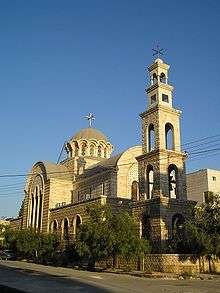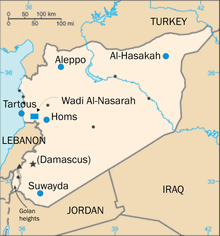Eastern Orthodoxy in Syria
Eastern Orthodoxy in Syria represents Christians in Syria who are adherents of the Eastern Orthodox Church. The Eastern Orthodox and 'Greek' Catholic (Arabic: المسيحية الشرقية في سوريا) tradition is represented in Syria by two distinct albeit historically and culturally related Byzantine communities: the Greek Orthodox Church of Antioch,[note 1] the largest and oldest Christian community in the country, closely followed by the Melkite Greek Catholic Church, itself a Uniate offshoot of the Greek Orthodox Church of Antioch.[1]


Dual self-designation: "Melkites" and "Eastern Romans"
Members of these communities in Syria and the Hatay province of Turkey (formerly part of Northern Syria), still call themselves Rûm which means "Eastern Roman" or "Asian Greek" in Arabic, both referring to the i.e. Byzantine inheritance, and indeed they follow its central Greek-language version of the Constantinian or Byzantine Rite.
In that particular context, the term "Rûm" is used in preference to "Yāwāni" or "Ionani" which means "European-Greek" or Ionian in Biblical Hebrew and Classical Arabic.
Members of these communities also call themselves "Melkites", which literally means "monarchists" or "supporters of the emperor" in Semitic languages (a reference to their ancient allegiance to Macedonian and Roman imperial rule), but, in the modern era, the term tends to be more commonly used by followers of the Greek Catholic Church of Antioch.
Presence in neighboring countries
These churches also exist in other parts of the Middle-East, notably Southern Turkey, Lebanon and Northern Israel and some Greek Orthodox intellectuals have been noted in the past for their secularist "pan-Arab" or "pan-Syrian" leanings, notably during the colonial and post-colonial eras. The Greek Orthodox Christians also have a long and continuous association with Orthodox Christian European nations such as Greece, Cyprus, Russia, Ukraine, Bulgaria, Serbia and Romania.
Notable Orthodox Christians in Syria
- Michel Aflak French-Syrian philosopher of Greek-Orthodox Lebanese descent, founder of the secularist Baath party[2]
- Dawoud Rajiha - Syrian Minister of Defense from 2011 to 2012.[3]
- Constantin Zureiq longtime history professor at the American University of Beirut and proponent of secular Arab nationalism
- Halim Barakat
- Ignatius IV of Antioch
- John X of Antioch
- Jules Jammal
- Joseph Sweid
- Mary Ajami
Cities, towns and villages with a Greek Orthodox Christian majority or large minority in Syria
Mhardeh, Al-Suqaylabiyah, Kafr Buhum, Safita, Wadi al-Nasara, Al-Kafrun, Mashta al-Helu, Maten al-Sahel, Marmarita, Hawash, Rabah, Syria, Kafr Ram, Deir Mama, Al-Bayda, Syria, Ma'loula, Saidnaya, Al-Suwayda, Salkhad, Zweitina, Ayn al-Barda, Muklous
See also
Notes
- In English translations of official documents, the Church of Antioch refers to itself as the Greek Orthodox Patriarchate of Antioch and All the East
References
- Syria: US State Department The July–December, 2010 International Religious Freedom Report
- Helms, Christine Moss (1984). Iraq: Eastern Flank of the Arab World. Brookings Institution Press. ISBN 978-0815735557.
- "Syria's Assad replaces defense minister with army chief of staff". Ha'aretz. 8 August 2011. Retrieved 28 July 2012.
